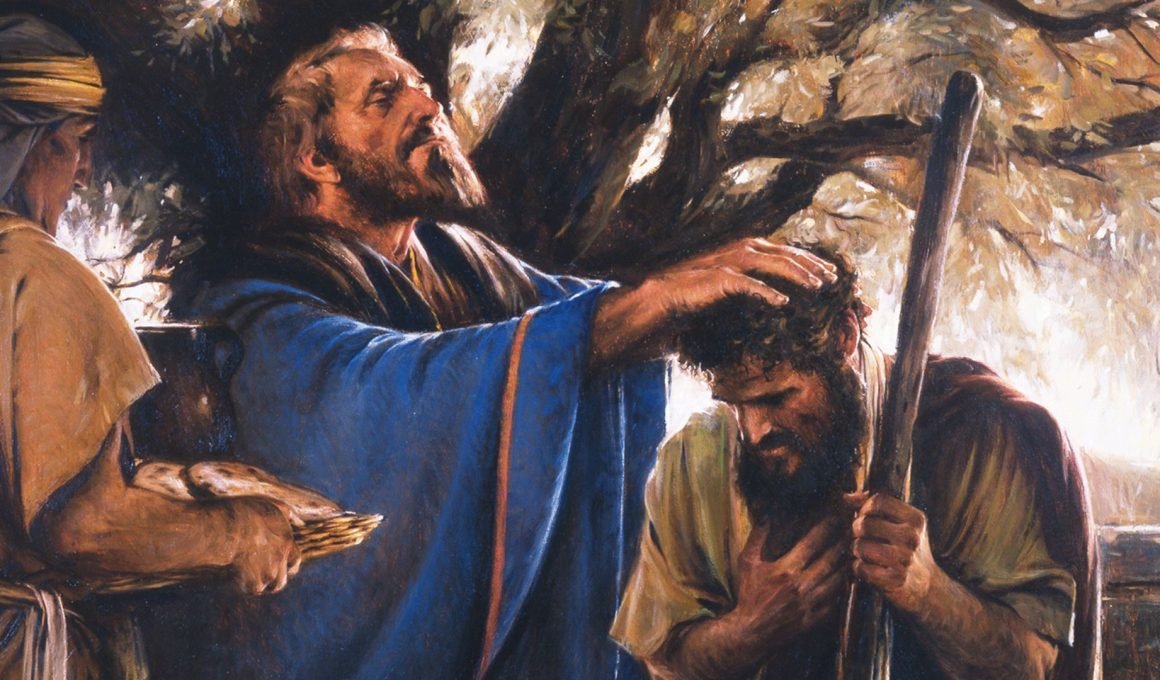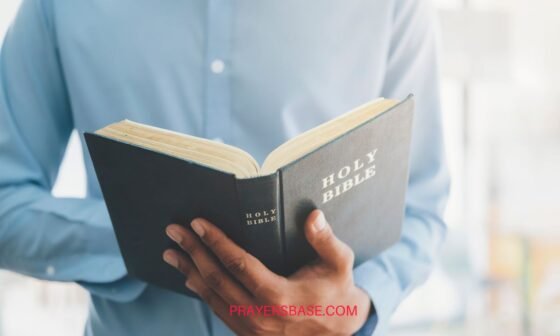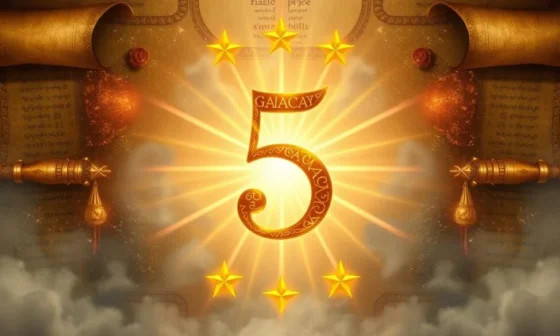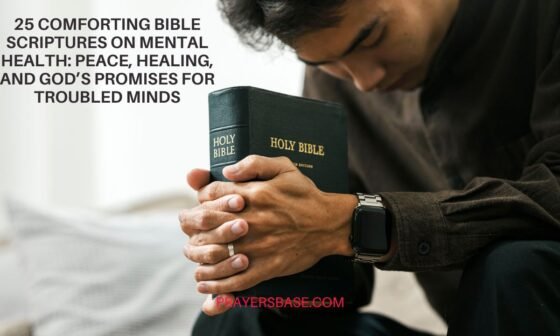Melchizedek, a mysterious figure in the Bible, appears briefly yet profoundly in the narratives of Genesis and Hebrews.
His enigmatic presence and role as both a king and a priest have fascinated scholars and theologians for centuries, offering rich insights into biblical history and theology.
In this article, we will look into the 13 characteristics of Melchizedek as portrayed in the Bible.
Melchizedek in the Bible
Melchizedek in the Bible is a mysterious figure who appears in the Book of Genesis and the Book of Hebrews, known as a priest-king who blessed Abraham.
Here are 13 characteristics of Melchizedek as portrayed in the bible.
1. Introduction to Melchizedek
In Genesis 14:18-20, Melchizedek steps into the narrative as both the king of Salem and a priest of God Most High. The city of Salem, later to be known as Jerusalem, holds historical and spiritual significance as a place of peace.
Melchizedek’s dual role as king and priest marks him as a unique figure not only in biblical literature but also within ancient Near Eastern cultural contexts.
His identity as a priest of God Most High, beyond the boundaries of Israelite tradition, underscores his universal spiritual authority and connection to the divine.
2. King of Salem
The title “King of Salem” highlights Melchizedek’s leadership in an ancient Canaanite city associated with peace. The name “Salem” itself derives from the Hebrew word meaning “peace,” suggesting that Melchizedek governed a place characterized by harmony and tranquility.
As a king, he wielded political authority and likely oversaw judicial matters, providing a stable environment conducive to spiritual pursuits.
His role as a king-priest in Salem signifies a unique blend of secular and religious authority, positioning him as a significant figure in earthly governance and spiritual matters.
Melchizedek’s encounter with Abram is marked by his blessing and communion with bread and wine, rituals that foreshadow later biblical practices such as the Eucharist. His sudden appearance and actions bless Abram, recognizing God’s role in Abram’s military victory and solidifying Melchizedek’s role as a divine favor and authority conduit.
Melchizedek’s brief appearance in Genesis sets the stage for deeper theological reflections found in the New Testament, particularly in the book of Hebrews, where he is celebrated as a type or foreshadowing of Jesus Christ.
His role as a priestly figure who predates the Levitical priesthood and his association with Salem underscore themes of universal priesthood and divine order that transcend ethnic and cultural boundaries.
3. Priest of God Most High
Melchizedek’s dual role as both king and priest of God Most High is a central aspect of his identity and significance in the biblical narrative. As a priest, Melchizedek serves not a local or regional deity, but the universal God Most High, El Elyon in Hebrew.
This title emphasizes God’s supremacy and sovereignty over all other gods and powers. Melchizedek’s priesthood is notable because it predates the establishment of the Levitical priesthood through Aaron and the tribe of Levi, highlighting his unique and elevated status in religious authority.
The role of a priest in ancient Near Eastern cultures typically involved mediation between humans and the divine, offering sacrifices, and invoking blessings on behalf of the people.
Melchizedek’s priesthood of God Most High underscores his spiritual authority and his ability to bless others in the name of the one true God, beyond the confines of Israelite covenantal boundaries. His priesthood stands as a precursor to the eternal priesthood attributed to Jesus Christ in the New Testament, symbolizing continuity and fulfillment in God’s redemptive plan.
4. Blessing Abraham
Following Abram’s victorious return from rescuing Lot and defeating the kings of Sodom and Gomorrah, Melchizedek encounters him in the Valley of Shaveh (Genesis 14:17-20).
Melchizedek’s response to Abram’s actions is immediate and profound. He blesses Abram with a declaration that highlights God’s role in granting Abram success and protection in battle:
Genesis 14:19-20 (NIV): “And he blessed him and said, ‘Blessed be Abram by God Most High, Creator of heaven and earth. And praise be to God Most High, who delivered your enemies into your hand.’ Then Abram gave him a tenth of everything.”
This blessing is significant for several reasons. First, it acknowledges God’s sovereignty and Abram’s faithful obedience to God’s call. Second, it reinforces the covenantal promises made to Abram, ensuring God’s protection and provision for him and his descendants.
Third, Melchizedek’s blessing carries spiritual weight, affirming Abram’s role as the chosen patriarch through whom God’s covenant blessings would flow to all nations.
Moreover, Melchizedek’s blessing incorporates elements of thanksgiving and praise to God Most High, emphasizing divine providence and acknowledging God’s direct intervention in human affairs.
This act of blessing not only strengthens Abram’s faith but also establishes Melchizedek as a spiritual mentor and mediator, foreshadowing the role of Jesus Christ as the ultimate mediator between God and humanity.
5. Receives Tithes from Abraham
Following Melchizedek’s blessing of Abraham, Abraham responds by offering a tithe, or a tenth, of all the spoils of war to Melchizedek. This gesture is significant because it establishes Melchizedek’s higher spiritual stature compared to Abraham himself, as affirmed in the New Testament book of Hebrews:
Hebrews 7:4-10 (NIV):
“Just think how great he was: Even the patriarch Abraham gave him a tenth of the plunder! Now the law requires the descendants of Levi who become priests to collect a tenth from the people—that is, from their fellow Israelites—even though they also are descended from Abraham.
This man, however, did not trace his descent from Levi, yet he collected a tenth from Abraham and blessed him who had the promises. And without doubt, the lesser is blessed by the greater.
In the one case, the tenth is collected by people who die; but in the other case, by him who is declared to be living. One might even say that Levi, who collects the tenth, paid the tenth through Abraham because when Melchizedek met Abraham, Levi was still in the body of his ancestor.”
This passage underscores Melchizedek’s unique position as a priest of God Most High who receives tithes directly from Abraham, the patriarch of Israel and the ancestor of the Levitical priests. It establishes Melchizedek’s precedence over the Levitical priesthood, which would later be formalized through the Mosaic law.
By accepting tithes from Abraham, Melchizedek symbolically affirms his spiritual authority and prefigures the priesthood of Jesus Christ, who would later be described as a High Priest in the order of Melchizedek.
6. Without Genealogy
One of the most mysterious aspects of Melchizedek is the absence of any recorded genealogy in the biblical texts. This detail is highlighted in the New Testament book of Hebrews, which contrasts Melchizedek with the Levitical priests who were required to prove their descent from Levi, the son of Jacob:
Hebrews 7:3 (NIV):
“Without father or mother, without genealogy, without beginning of days or end of life, resembling the Son of God, he remains a priest forever.”
This description portrays Melchizedek in almost mythical terms, emphasizing his eternal and symbolic significance. The absence of genealogy signifies Melchizedek’s unique status as a priest whose priesthood transcends human lineage and temporal boundaries.
Unlike the Levitical priests who served under the Old Covenant, Melchizedek’s priesthood is perpetual and foreshadows the eternal priesthood of Jesus Christ.
The comparison to “resembling the Son of God” in Hebrews underscores Melchizedek’s typological connection to Jesus Christ, who is also described as a priest forever in the order of Melchizedek (Hebrews 7:17).
This parallel highlights Melchizedek as a foreshadowing figure who points forward to the ultimate High Priest, Jesus Christ, whose priesthood surpasses the limitations of earthly priesthoods and mediates a new and everlasting covenant between God and humanity.
7. A Type of Christ
Melchizedek is recognized throughout the Bible as a significant foreshadowing figure of Jesus Christ. Several aspects of Melchizedek’s character and actions prefigure Christ’s ministry and sacrificial role:
- Dual Role as King and Priest: Melchizedek combines the roles of king of Salem and priest of God Most High, a unique dual position that later echoes in Jesus Christ, who is both King of kings and the ultimate High Priest (Hebrews 7:1-3).
- Blessing of Abraham: Melchizedek blesses Abraham after his victorious return from battle, invoking God’s Most High and recognizing His role in Abraham’s success (Genesis 14:19-20). Similarly, Jesus blesses His followers and intercedes for them before God, demonstrating divine favor and mediation.
- The offering of Bread and Wine: In Genesis 14:18, Melchizedek brings out bread and wine, symbolizing his priestly role and possibly hinting at the future institution of the Eucharist, where bread and wine symbolize Christ’s body and blood (Matthew 26:26-28).
These parallels illustrate Melchizedek as a prototype or type of Christ, pointing forward to Christ’s own ministry as a priest who offers spiritual sustenance and blessing to His people.
8. Enduring Priesthood
Melchizedek’s priesthood stands in contrast to the Levitical priesthood established under the Law of Moses. Unlike the Levitical priests who served under strict genealogical requirements and offered sacrifices that needed continual repetition, Melchizedek’s priesthood is described as enduring forever:
Hebrews 7:3 (NIV):
“Without father or mother, without genealogy, without beginning of days or end of life, resembling the Son of God, he remains a priest forever.”
This eternal aspect of Melchizedek’s priesthood serves as a theological archetype of Christ’s eternal priesthood. Jesus Christ, as the perfect High Priest, offers a once-for-all sacrifice for sin (Hebrews 7:27), establishing a new covenant that supersedes the Old Covenant rituals and requirements.
9. Superiority to Abraham
The author of Hebrews underscores Melchizedek’s superiority to Abraham and, by extension, the Levitical priesthood descended from him. Melchizedek’s reception of tithes from Abraham and his blessing of him highlight his higher spiritual stature:
Hebrews 7:4-10 (NIV):
“Just think how great he was: Even the patriarch Abraham gave him a tenth of the plunder! Now the law requires the descendants of Levi who become priests to collect a tenth from the people—that is, from their fellow Israelites—even though they also are descended from Abraham.
This man, however, did not trace his descent from Levi, yet he collected a tenth from Abraham and blessed him who had the promises. And without doubt, the lesser is blessed by the greater.
In the one case, the tenth is collected by people who die; but in the other case, by him who is declared to be living. One might even say that Levi, who collects the tenth, paid the tenth through Abraham because when Melchizedek met Abraham, Levi was still in the body of his ancestor.”
This passage emphasizes Melchizedek’s preeminence over Abraham, the patriarch of Israel, and over the Levitical priesthood that descended from Abraham.
By receiving tithes from Abraham and blessing him, Melchizedek demonstrates his authority and spiritual significance, foreshadowing the surpassing priesthood of Jesus Christ, who is superior to all earthly and legalistic forms of priesthood.
10. A Priestly Order
The concept of the “order of Melchizedek” emerges prominently in the book of Hebrews, portraying Melchizedek not merely as an individual figure but as the archetype of a priestly order that prefigures and surpasses the Levitical priesthood:
Hebrews 7:11-17 (NIV):
“If perfection could have been attained through the Levitical priesthood—and indeed the law given to the people established that priesthood—why was there still need for another priest to come, one in the order of Melchizedek, not in the order of Aaron? For when the priesthood is changed, the law must be changed also.
He of whom these things are said belonged to a different tribe, and no one from that tribe has ever served at the altar. For it is clear that our Lord descended from Judah, and regarding that tribe Moses said nothing about priests.
And what we have said is even more clear if another priest like Melchizedek appears, one who has become a priest not based on a regulation as to his ancestry but based on the power of an indestructible life. For it is declared: ‘You are a priest forever, in the order of Melchizedek.'”
This passage underscores the superiority of Christ’s priesthood over the Levitical priesthood. Unlike the Levitical priests who served under the Law of Moses and were limited by genealogical descent from the tribe of Levi, Jesus Christ was appointed as a priest forever in the order of Melchizedek.
This “order” signifies a priesthood based on spiritual and eternal principles rather than legalistic regulations, highlighting Christ’s unique ability to offer eternal salvation through His sacrifice.
11. Silent Disappearance
After blessing Abraham and receiving tithes from him, Melchizedek disappears from the biblical narrative without any further mention. This mysterious departure adds to the intrigue surrounding his identity and purpose:
Genesis 14:18-20 (NIV):
“Then Melchizedek king of Salem brought out bread and wine. He was a priest of God Most High, and he blessed Abram, saying, ‘Blessed be Abram by God Most High, Creator of heaven and earth. And praise be to God Most High, who delivered your enemies into your hand.’ Then Abram gave him a tenth of everything.”
This brief encounter with Abraham is the only historical record of Melchizedek in the Old Testament. His sudden appearance and disappearance without genealogy or historical background contribute to his enigmatic status, leaving readers to ponder his significance and role in God’s redemptive plan.
12. Messianic Prophecy
Psalm 110:4 contains a significant messianic prophecy that refers to a priest forever in the order of Melchizedek:
Psalm 110:4 (NIV):
“The Lord has sworn and will not change his mind: ‘You are a priest forever, in the order of Melchizedek.'”
The author of Hebrews interprets this prophecy as applying to Jesus Christ, highlighting the fulfillment of Melchizedek’s archetype in the person and work of Christ:
Hebrews 5:5-6 (NIV):
“In the same way, Christ did not take on himself the glory of becoming a high priest. But God said to him, ‘You are my Son; today I have become your Father.’ And he says in another place, ‘You are a priest forever, in the order of Melchizedek.'”
This prophecy underscores Jesus Christ’s eternal priesthood and His role as the ultimate mediator between God and humanity, surpassing the temporary and ceremonial aspects of the Levitical priesthood.
13. Symbol of Unity
Melchizedek’s dual role as king of Salem and priest of God Most High, his blessing of Abraham, and his reception of tithes symbolize unity between royalty and priesthood—a unity later realized in the person of Jesus Christ:
- King and Priest: Melchizedek foreshadows Jesus Christ, who is both the King of kings and the eternal High Priest.
- Blessing and Tithes: Melchizedek blesses Abraham and receives tithes from him, signifying his spiritual authority and foreshadowing Christ’s blessing and provision for His people.
Conclusion
Melchizedek stands as a mysterious and significant figure in biblical history and theology. His unique role as both king and priest, his blessing of Abraham, and his enduring archetype in the priesthood all point forward to Jesus Christ, the ultimate King of Peace and High Priest forever in the order of Melchizedek.
Studying Melchizedek enriches our understanding of God’s redemptive plan and the spiritual truths revealed in Scripture.







